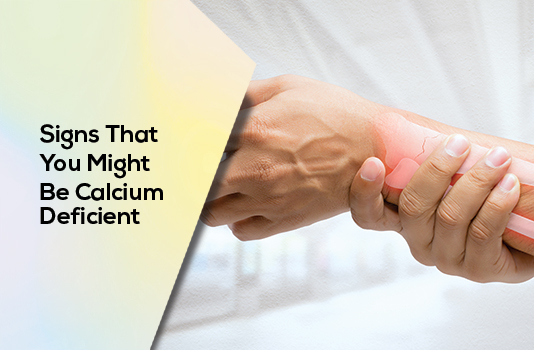When it comes to public knowledge about milk, it is synonymous to stronger bones and teeth. But does it actually help with making bones stronger? In reality milk wasn’t ever directly related to stronger bones, but Calcium. One of the most important minerals in our body, Calcium is almost entirely found in the bones, 99% to be exact. Calcium combines with other minerals to form hard crystals that give our bones strength and structure. Remaining 1% is found in blood, muscles and other tissues, since it is also required by the heart, muscles, and nerves to function properly.
Calcium Deficiency Symptoms
If adequate Calcium requirement isn’t met, you might experience a multitude of health issues. Adults need 700mg of Calcium daily, for the body to function normally. Failing to do so, might make you develop Calcium deficiency. Although they take some time to manifest and show, these symptoms can create a number of health issues. Here are some signs you need to look out for to avoid it:
1. Frequent muscle spasms or cramps
Muscle spasms and cramps are two of the most common symptoms of Calcium deficiency and are also one of the firsts to appear. Calcium plays an important role in muscular contractions and regulates the rate of contraction of the cardiac muscles.
Deficiency of Calcium causes the body to take Calcium from the bones to carry out muscular functions. This results in leg and arm pain, spasms and cramps even while doing light physical activity.

2. Brittle nails and bad skin
Extremely low Calcium levels often result in brittle nails and dry skin.
Nails are made up of hardened keratin and include a significant level of Calcium deposit as well. Calcium deficient nails have a tad bit different texture. Lack of calcium in the body can lead to dry and brittle nails that split, break or peel off easily. TrueBasics Calcium plays a key role in maintaining the hardness and structure of nails, and keeps the tissues of the nail bed healthy.
3. Frequent fractures and bone breakage
One of the most obvious signs of low Calcium levels in your body is fractures & bone breakage. Since almost 99% of our body’s Calcium is in our bones, therefore it is not surprising that Calcium deficiency would impact our bone health as well.
Low levels of Calcium in the body can cause our bones to weaken, leaving them prone to easy fractures and breakage.
4. Occurrence of blood clotting
While Vitamin K is an important nutrient for blood clotting, Calcium plays an important part in the blood clotting process too. Vitamin K and fibrinogens, along with Calcium work together to help the body form clots, in order to avoid excessive bleeding. Therefore, any issues in blood clotting may be one of the symptoms of low Calcium in body.
5. Visibly dry skin and eczema
Calcium is also found on the outer layers of skin (epidermis) where it plays an important role in repairing and self-replenishing. Some studies have also linked Calcium presence to skin ageing. Low levels of Calcium in the body can result in dry and itchy skin.
As an extreme case, deficiency of Calcium causes eczema. It’s a skin disorder that can develop due to a chronic deficiency of Calcium. Eczema is the general term for skin rashes and inflammations. The signs include itchiness, redness, and blisters on the skin. Although treatable with topical ointments and medication, it is still considered best to correct your Calcium intake as well.
6. Rapid hair loss
Calcium plays a key role in keeping the hair healthy. It helps with the secretion of hormones and certain enzymes, such as biotin, that help with hair growth. Deficiency of Calcium can lead to the hair becoming brittle, coarse and weak. A rapid hair loss could be one of the symptoms of Calcium deficiency in the body.

7. Menstrual cramps
Surprisingly, Calcium also plays a role in women’s period cycles. Calcium deficiency in females can increase menstrual distress, causing high intensity period cramps. A study focused on the effects of Calcium supplement on PMS symptoms noted that Calcium supplementation for three menstrual cycles reduced core PMS symptoms in women.
8. Osteoporosis
Chronic calcium deficiency in its severe form can lead to osteoporosis.
Osteoporosis is a medical condition where the bones become extremely weak and are at greater risk of sudden and unexpected fracture.
It results in increased loss of bone mass and strength. The loss of bone is often progressive and without any pain.
Until the age of 30, our body generally builds more bone than it loses. However, after the age of 30, the bone breakdown is faster than rebuilding, leading to a gradual loss of bone mass and a higher risk of osteoporosis.
Osteoporosis can be diagnosed by undertaking a bone mineral density test.
9. Irregular heartbeat
The heart is the most important muscle in the human body and is dependent on calcium to help with its regular contractions.
Calcium is needed to send signals through the nerves to the heart muscle for pumping blood throughout the body.
Lack of calcium in the body can upset this signal and cause an abnormal heartbeat.
10. Seizures
While a seizure could be caused due to several factors – the first suspect can be a chronic lack of calcium.
A few studies have indicated that hypoglycemia can lead to neurological manifestations including tetany, seizures, and delirium.
Neurotransmitter release and muscle contraction are key processes for neuromuscular activity. Both of these processes require adequate calcium levels in the body to function properly. Calcium deficiency can disrupt these functions and cause seizures.
11. Tooth decay
After bones, teeth hold the most calcium in the body. Symptoms of calcium deficiency on teeth can be well noticeable. Due to the occurrence of this deficiency, the body starts to pull calcium from the teeth as well.
This can result in dental problems, brittle gums, and tooth decay.
12. Depression
Among other factors, depression and other mood disorders stem from dysfunction in the central nervous system as well.
Calcium helps in transmitting messages in nerves and therefore plays a key role in releasing hormones and assists muscle functioning.
Symptoms of dysfunction of the nervous system due to low levels of calcium can manifest in the form of depression, irritability, and other mood related disorders.
13. High blood pressure or hypertension
Several studies have been done establishing the effects of calcium deficiency on blood pressure. Low calcium levels have been shown to increase blood pressure while adequate calcium supplementation has been shown to bring down systolic blood pressure.
However, the range of increase/decrease in blood pressure is still an ongoing debate.
How to increase your Calcium intake?
Calcium is an all purpose mineral and plays a critical part in many of our body functions and general well-being. When it comes to Calcium deficiency treatment, natural foods rich in Calcium as well as supplementation play an important role. Apart from dairy products, leafy green vegetables, beans, tofu, figs, nuts, and fishes like sardines, salmon, and tuna are some of the natural ways to fulfil your daily Calcium requirement. For quicker results, natural supplements are a great way to minimise the effects of Calcium deficie ncy.
TrueBasics Advanced Calcium with Vitamin D3, Vitamin K2-MK7, Magnesium, Zinc & Alfalfa
TrueBasics Advanced Calcium is a comprehensive formula of highly absorbable Calcium blended with vitamins D3 & K2-MK7, clinically researched Acticissus®, magnesium, zinc, and potent herbal extracts to help strengthen your bones, joints & muscles. It also helps maintain bone and joint health in post-menopausal women.









